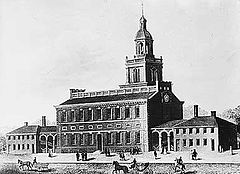Pennsylvania Mutiny of 1783

Independence Hall in Philadelphia
|
|
| Date | June 20, 1783 |
|---|---|
| Location | Philadelphia, Pennsylvania |
| Also known as | Philadelphia Mutiny |
| Participants | Congress of the Confederation, soldiers from the Pennsylvania Line |
| Outcome | Capital moved from Philadelphia, creation of federal district |
The Pennsylvania Mutiny of 1783 (also known as the Philadelphia Mutiny) was an anti-government protest by nearly 400 soldiers of the Continental Army in June 1783. The mutiny, and the refusal of the Executive Council of Pennsylvania to stop it, ultimately resulted in Congress vacating Philadelphia and the creation of a federal district to serve as the national capital.
From March 1781, the Congress of the Confederation and the Supreme Executive Council of the Commonwealth of Pennsylvania were situated at the Pennsylvania State House (now known as Independence Hall) in Philadelphia. Under the authority of the Articles of Confederation, Congress did not have direct control over the military, except in times of war, and was largely reliant on the use of state militias to enforce laws and keep order.
On June 17, 1783, Congress received a message from soldiers of the Continental Army stationed in Philadelphia, which demanded payment for their service during the American Revolutionary War. The soldiers threatened to take action that day if their complaints were not addressed. Congress ignored their message, but the soldiers did not act on their threat. Two days later, however, the Congress received word that a group of about 80 soldiers had left their post at Lancaster, Pennsylvania, approximately 60 miles (97 km) west of Philadelphia, and had joined with the soldiers stationed at the city barracks. The group of approximately 500 men had effective control over the weapons stores and munition depot.
The next morning on June 20, the State House was mobbed by as many as 400 soldiers demanding payment. The soldiers blocked the door and initially refused to allow the delegates to leave. Alexander Hamilton, then a delegate from New York, persuaded the soldiers to allow Congress to meet later to address their concerns. The soldiers did allow the members of Congress to peacefully adjourn that afternoon. That evening, a small Congressional committee, headed by Hamilton, met in secret to draft a message to the Pennsylvania Council, asking them to protect Congress from the mutineers. The letter threatened that Congress would be forced to move elsewhere if the Council did not act.
...
Wikipedia
